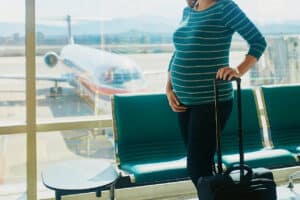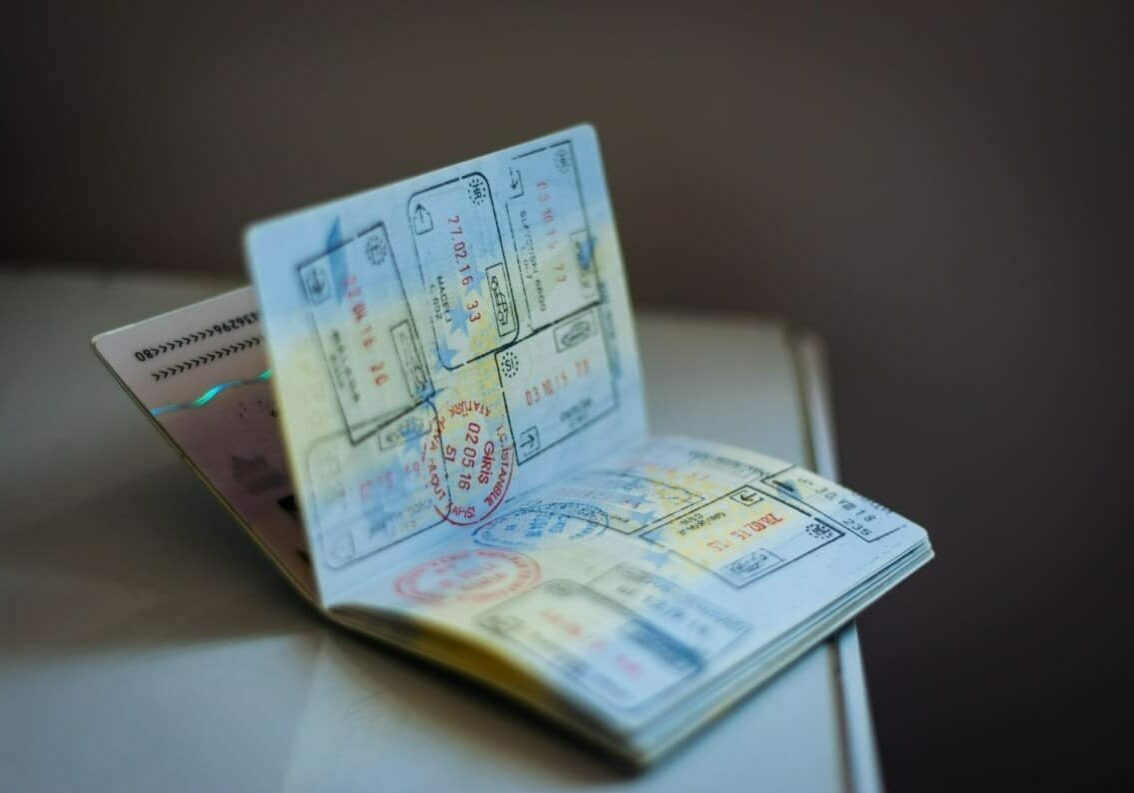Despite no official numbers being available, it is estimated that birth tourism attracts interest from thousands of people every year.
This practice, also known as birthright citizenship, involves a pregnant woman visiting another country to give birth there so that their child will be given automatic citizenship.
Parents often pursue birth tourism to secure dual citizenship for their newborn, expand future residency and education options, and unlock visa-free travel benefits.
However, birth tourism also raises ethical concerns, legal debates, and policy changes in many birth tourism countries.
In this guide, we’ll explore the meaning of birth tourism, the best countries for birth tourism in 2025, the benefits and risks involved, and important legal considerations if you’re thinking about going this route:
What is birth tourism?

Under jus soli (“right of the soil”) laws, any child born in that country typically becomes a citizen, regardless of the parents’ nationality or immigration status at the time of the birth.
Families choose birth tourism for several reasons, including:
- Citizenship through birth that offers long-term security and residency rights.
- Dual citizenship benefits, such as access to healthcare, education, and property ownership.
- A powerful passport with visa-free travel to many countries.
- The ability for the child to sponsor family members for immigration in the future.
While birth tourism is legal in many destinations, such as the United States, Canada, and parts of Latin America, some countries have recently introduced laws to ban or restrict birth tourism due to concerns over immigration and visa fraud, and strain on public resources.
What are the benefits of choosing birth tourism?
Families pursue birth tourism for a range of personal, legal, and economic reasons. The main motivation is to secure citizenship through birth, which can open doors to better opportunities and increased security for the child.
Key benefits of birth tourism include:
- Dual citizenship for newborns: Many countries allow children to hold both their parents’ nationality and citizenship acquired by birth. This dual citizenship status can make it easier to live, work, or study internationally.
- Visa-free travel benefits: A child born in one of the countries with birthright citizenship, like the United States or Canada, often receives a passport. These passports can offer visa-free or visa-on-arrival travel access to over 180 countries, providing exceptional global mobility. This is especially helpful if you come from a country with one of the weakest passports.
- Future residency and settlement options: Citizenship obtained at birth can serve as a Plan B passport to use for long-term residency, higher education opportunities, or future relocation. For example, U.S. citizens can access public universities at resident tuition rates.
- Economic advantages: Some families consider birth tourism a strategic investment, enabling easier access to banking, education funding, and property ownership.
- Potential cost savings over investment visas: While citizenship by investment in places like Portugal or St. Kitts and Nevis can require substantial contributions, birth tourism can help an individual achieve citizenship at a fraction of that cost, mainly limited to medical care and travel expenses.
However, these benefits also come with financial, ethical, and legal considerations. Birth tourism can be expensive, with delivery costs in private hospitals ranging from $5,000 to over $50,000 USD, depending on the destination and level of care.
12 Best Countries for Birth Tourism
1. Portugal
Portugal is a noteworthy birth tourism destination because of its favorable citizenship laws, particularly for children born on Portuguese soil. Whether the parents are non-residents or residents, Portugal offers significant benefits to both the child and the parents, provided certain conditions are met for Portuguese citizenship by birth.
According to Global Intelligence Unit’s briefing on how Portugal’s economy is being revitalized by immigration, immigrants are playing a central role in Portugal’s economic resurgence. As the country faces demographic challenges like an aging population and declining birth rates, immigrants and foreign families have become essential to sustaining a balanced workforce and supporting the pension system.
While birth tourism itself is only one small part of these migration patterns, it reflects Portugal’s openness to attracting new residents and creating opportunities for families seeking Portugal citizenship.
Conditions for birthright citizenship
Children born in Portugal can acquire Portugal citizenship if at least one parent has been a legal resident in the country for at least one year before birth or if one parent is a Portuguese citizen. This creates a clear path to citizenship through birth and the possibility of dual citizenship for the child.
Hospital costs
- Public hospitals in Portugal usually offer free or low-cost services for residents.
- Private hospitals can charge between €4,000 and €7,000 for delivery services, depending on the complexity of the birth and the hospital chosen.
2. Ireland
Ireland used to offer unconditional jus soli citizenship until 2005, when birthright laws changed. Despite these restrictions, Ireland remains an attractive birth tourism country because of its pathways to residency and, eventually, citizenship.
Conditions for citizenship by birth
For a child to obtain Irish citizenship by birth, the parents must meet residency criteria:
- If neither parent is an Irish citizen, the child can still acquire citizenship if at least one parent has legally resided in Ireland for three out of the four years immediately preceding the birth.
- Temporary forms of stay, such as student visas, do not count toward this requirement.
Hospital costs
- Public hospitals in Ireland offer free or low-cost services for residents.
- Private hospital costs for non-residents typically range from €4,000 to €10,000 or more, depending on delivery type and care needed.
3. Spain
Spain is another famous birth tourism destination, although it does not grant automatic birthright citizenship. Citizenship by birth is conditional, but Spain offers benefits that can help the family’s long-term settlement plans.
Conditions for citizenship by birth
-
If neither parent is a Spanish citizen, a child can apply for Spanish citizenship after completing one year of continuous legal residency in Spain.
While the process is not automatic, Spanish law allows parents to pursue residency through family reunification once the child becomes a citizen.
Hospital costs
- For residents or those covered by Spain’s national health system, public hospital births are free or low-cost.
- Non-residents in private hospitals may pay between €3,000 and €8,000, depending on the level of care and delivery method.
4. Luxembourg
Luxembourg offers conditional citizenship by birth based on the child’s and parents’ residency status. Though not as accessible as unconditional birth tourism countries, Luxembourg remains attractive because of the access it gives to the strong EU citizenship and clear legal pathways.
Conditions for citizenship by birth
A child born in Luxembourg can acquire citizenship if:
- At age 18, both parents were physically present in Luxembourg in the 12 months preceding birth; or
- At age 18, the child has lived continuously in Luxembourg for the five years preceding their 18th birthday.
This creates a delayed but secure route to citizenship through birth.
Hospital costs
- Public healthcare is covered under Luxembourg’s national health insurance system.
- Private hospital costs for non-residents range from €5,000 to €8,000, depending on delivery type and care.
5. Greece
Greece has restrictive jus soli policies and does not grant automatic citizenship by birth to a child born to foreign parents. However, Greece remains an appealing birth tourism destination due to its strong EU passport and family benefits.
Conditions for birthright citizenship
- Children born in Greece can apply for Greek citizenship if their parents are legal residents and the child completes at least six years of schooling in the country.
This creates a longer-term pathway to citizenship and residency rights for the entire family.
Hospital costs
- Public hospitals are generally free or low-cost for residents.
- Non-residents choosing private hospitals may pay between €3,000 and €6,000 or more.
6. Italy
Similar to Greece, Italy follows strict jus sanguinis (right of blood) citizenship laws, making citizenship by birthhighly restricted. Birth tourism in Italy does not automatically confer citizenship but may help families settle long-term through other legal pathways, including immigrant investor programs and residency visas.
Conditions for citizenship by birth
- If both parents are foreign nationals, a child can apply for Italian citizenship at the age of 18, provided they have lived continuously in Italy since birth.
- Alternatively, children who have been permanent residents since turning 18 can apply at age 21 or older.
This creates a delayed pathway to citizenship that requires long-term residency and integration into Italian society. Without meeting these residency and continuous living conditions, the child may only obtain Italian citizenship through other means, such as naturalization or Italian citizenship by descent.
Parents who wish to establish residency sooner can explore options like work permits or family reunification.
Hospital costs
- Public hospitals offer low-cost or free services for residents under Italy’s national health insurance system (Servizio Sanitario Nazionale, SSN).
- For non-residents or those choosing private care, childbirth costs can range from €3,000 to €7,000, depending on the hospital and type of delivery.
7. Canada
Canada remains one of the most popular birth tourism destinations, offering unconditional citizenship by birth. Any child born on Canadian soil automatically gains Canadian citizenship, regardless of the parents’ immigration status.
Conditions for birthright citizenship
-
The Canadian Citizenship Act grants automatic citizenship to all people born in the country, except those born to foreign diplomats.
Hospital costs
- Public healthcare covers Canadian residents.
- Non-residents can expect to pay CAD 10,000 to CAD 25,000, covering hospital stays, doctors’ fees, and delivery expenses.
8. Mexico
Mexico is another birth tourism-friendly country with unconditional jus soli citizenship. It also offers legal pathways for parents to apply for residency after the child is born, making it attractive for families pursuing dual citizenship and settlement in Latin America.
Conditions for citizenship by birth
- Any child born in Mexico automatically becomes a Mexican citizen. No further applications are required.
Hospital costs
- Public hospitals often provide low-cost or free care for residents.
- Non-residents using private facilities can expect to pay between $2,000 and $5,000 USD.
9. Antigua and Barbuda
Antigua and Barbuda are considered excellent birth tourism destinations because they grant unconditional citizenship by birth, with only a few requirements to qualify.
Another attractive aspect of this birth tourism country is that parents can apply for residency and, after two years, for citizenship and an Antigua and Barbuda passport, providing valuable options for dual citizenship and long-term settlement.
Conditions for citizenship by birth
- Antigua and Barbuda grants automatic citizenship through birth to any child born in the country after October 31, 1981, except for children of foreign diplomats and foreign parents whose country is at war with the Antiguan and Barbudan government.
Hospital costs
- In a private hospital, childbirth typically ranges from $3,000 to $5,000, depending on the level of care and delivery method.
10. Costa Rica
Costa Rica is a beautiful birth tourism destination in Latin America, and fortunately, the country grants automatic citizenship by birth to people born on its soil. It also offers parents the advantage of applying for permanent residency through family reunification laws.
After seven years, parents can apply for Costa Rican citizenship, creating a clear pathway to dual citizenship and expanded residency rights.
Conditions for citizenship by birth
Under the terms of Article 13 of the Constitution and Article 1 of the Options and Naturalizations Act, those who are eligible for birthright citizenship include persons born in Costa Rica whose birth was recorded in the Civil Registry by a parent while a minor or by themselves before their 25th birthday.
Hospital costs
The cost of a private hospital birth typically ranges from $3,500 to $6,000, depending on your choice of hospital, type of birth (natural or cesarean), and other factors.
11. Brazil
Brazil is considered an excellent birth tourism destination because it grants unconditional citizenship by birth to any child born on Brazilian soil. Another attractive aspect of this birth tourism country is that parents can apply for legal residency after the birth of their child, eventually creating a clear pathway to permanent settlement and dual citizenship options
Conditions for citizenship by birth
Brazil practices automatic citizenship through birth, meaning any child born in the country automatically acquires Brazilian nationality, regardless of the parents’ citizenship or immigration status. The only exceptions are children born to foreign diplomats or parents officially representing another government. Citizenship matters are regulated by the Ministry of Justice and Public Security of Brazil.
Hospital costs
In private hospitals, childbirth typically ranges from $3,000 to $7,000 USD, depending on the hospital, the type of delivery, and any additional medical care required.
12. Argentina
Argentina is also regarded as a popular birth tourism destination, offering unconditional birthright citizenship to children born in the country. One of the main advantages for parents is the opportunity to apply for legal residency shortly after the child’s birth, supporting long-term plans for dual citizenship and settlement in South America.
Conditions for citizenship by birth
Under Argentina’s birthright citizenship laws, any child born in the country automatically becomes an Argentine citizen. This applies regardless of the parents’ nationality or residency status, except in cases involving accredited foreign diplomats. Citizenship regulations are administered by the Dirección Nacional de Migraciones Argentina.
Hospital costs
Private hospital births in Argentina generally range from $2,500 to $5,000 USD, depending on the hospital chosen, the type of delivery, and the level of care provided.
Legal and Policy Considerations
Birth tourism laws and regulations vary greatly by country. While nations like the United States, Canada, and Mexico have maintained birthright citizenship laws (jus soli), others have introduced strict policies to limit automatic citizenship.
Countries banning or closely regulating birth tourism often cite concerns over immigration and visa fraud, healthcare costs, and social services. For example, the United Kingdom, Australia, and most EU countries do not grant unconditional citizenship by birth for these reasons.
Birth tourism visa policies have also tightened in recent years. Some countries require expectant mothers to declare their pregnancy when applying for a visa or entering at the border. In the United States, consular officers are instructed to scrutinize tourist visa applications if they suspect the applicant plans on giving birth during their stay.
How countries regulate birth tourism varies. Measures can include:
- Denying entry to visibly pregnant women traveling without medical documentation or proof of financial means
- Requiring advance payment for maternity care to prevent unpaid hospital bills
- Limiting eligibility for public health services to legal residents
In addition to legal considerations, there are ethical concerns in birth tourism. Critics argue that it can undermine immigration systems, overburden healthcare facilities, and create inequalities between citizens by birth and long-term residents. Proponents see it as a legitimate strategy to secure better futures for children through citizenship by birth and dual citizenship opportunities.
Healthcare and Costs
Planning for healthcare is a critical part of any birth tourism journey. Access to maternal care for birth tourists depends on the country and whether the family chooses public or private facilities.
In countries like Canada and the United States, non-residents are typically not eligible for public health insurance. This means parents must pay all costs out of pocket or secure birth tourism insurance to cover expenses. Policies can include coverage for prenatal visits, delivery, emergency care, and newborn hospitalization.
Birth tourism hospitals often market specialized packages that include:
- Private maternity suites.
- Bilingual staff.
- Dedicated case managers familiar with immigration paperwork.
- Concierge services for visa extensions and birth certificate processing.
Cost of birth tourism can vary widely depending on destination:
- United States: $10,000 to $50,000 USD for private hospital births.
- Canada: CAD 10,000 to 25,000.
- Mexico: $2,000 to 5,000 USD.
- Brazil and Argentina: often more affordable, ranging from $3,000 to $7,000 USD.
Families should also budget for accommodation, transportation, and legal fees associated with registering the birth and applying for passports.
Frequently Asked Questions about Birth Tourism
What is birth tourism?
Birth tourism is the when a person travels to another country specifically to give birth so that the child automatically acquires citizenship through birthright laws (jus soli).
Is birth tourism legal?
Birth tourism itself is generally legal in countries that offer unconditional birthright citizenship.
However, using fraudulent documents, misrepresenting the purpose of travel, or overstaying visas can be illegal. Some nations have introduced regulations to discourage or monitor birth tourism practices.
What are the benefits of birth tourism?
Birth tourism benefits include automatic citizenship through birth, the option for dual citizenship, visa-free or visa-on-arrival access to many countries, access to public services, and the possibility of sponsoring family members in the future. It can also create a backup residency option for the child.
What are the risks of birth tourism?
Risks of birth tourism can include high costs of medical care and lodging, legal issues if immigration rules are violated, potential denial of entry, and challenges proving ties to the birth country later. In some cases, children might face complex tax or military obligations due to dual citizenship.
What are the visa requirements for birth tourism?
Visa requirements for birth tourism depend on the country. Many nations require a valid tourist visa or ESTA authorization, proof of financial means, and sometimes evidence of medical insurance. Some countries may ask travelers to declare the purpose of their visit, and failure to disclose intent could result in denial of entry.
How does birth tourism impact immigration policies?
Birth tourism has led some countries to tighten visa policies, enhance border screening, and limit automatic citizenship rights.
Governments may introduce rules requiring at least one parent to be a citizen or legal resident to qualify for birthright citizenship, aiming to prevent misuse and protect social services.
Which countries grant citizenship by birth?
Countries that still grant unconditional citizenship by birth (jus soli) include the United States (for now), Canada, Mexico, Brazil, Argentina, Chile, and most Caribbean nations such as St. Kitts and Nevis and Dominica.
Many European and Asian countries do not offer automatic citizenship by birth.
How does birth tourism affect the child’s future citizenship options?
Birth tourism can significantly expand a child’s future citizenship options. Persons born in a birthright citizenship country may have the right to live, study, and work there indefinitely, hold a passport with broad visa-free access, and sponsor family members for residency. However, they may also face tax obligations or mandatory military service in some cases.
Are there ethical concerns with birth tourism?
Yes, birth tourism raises ethical concerns about fairness, strain on public healthcare systems, and potential exploitation of immigration loopholes.
Critics argue that it can divert resources from residents and create legal complexities around citizenship, while supporters see it as a legitimate path to secure a better future for children.
Did the US cancel birthright citizenship?
No, the USA has not canceled birthright citizenship. Children born in the U.S. still automatically receive American citizenship under the 14th Amendment.
In 2025, an executive order tried to limit this right, but it has been blocked by ongoing court cases. Citizenship by birth remains in effect while legal challenges continue.
What is a birth tourism scheme?
This type of scheme generally refers to organized arrangements or services that help pregnant women travel to another country specifically to give birth and obtain citizenship for their baby.
How common is birth tourism among pregnant Chinese women?
While exact numbers are hard to confirm, media reports and government data in countries like the United States and Canada indicate that thousands of Chinese women have participated in birth tourism schemes over the past decade.






